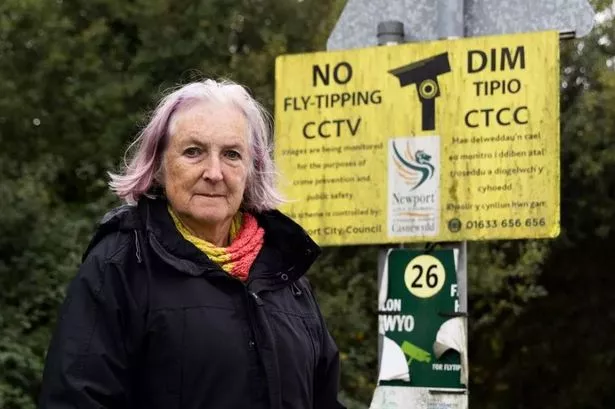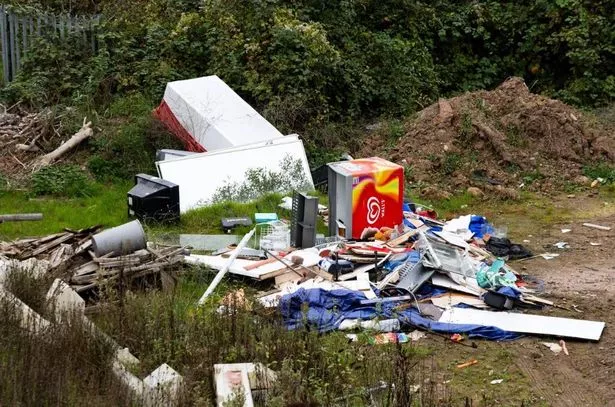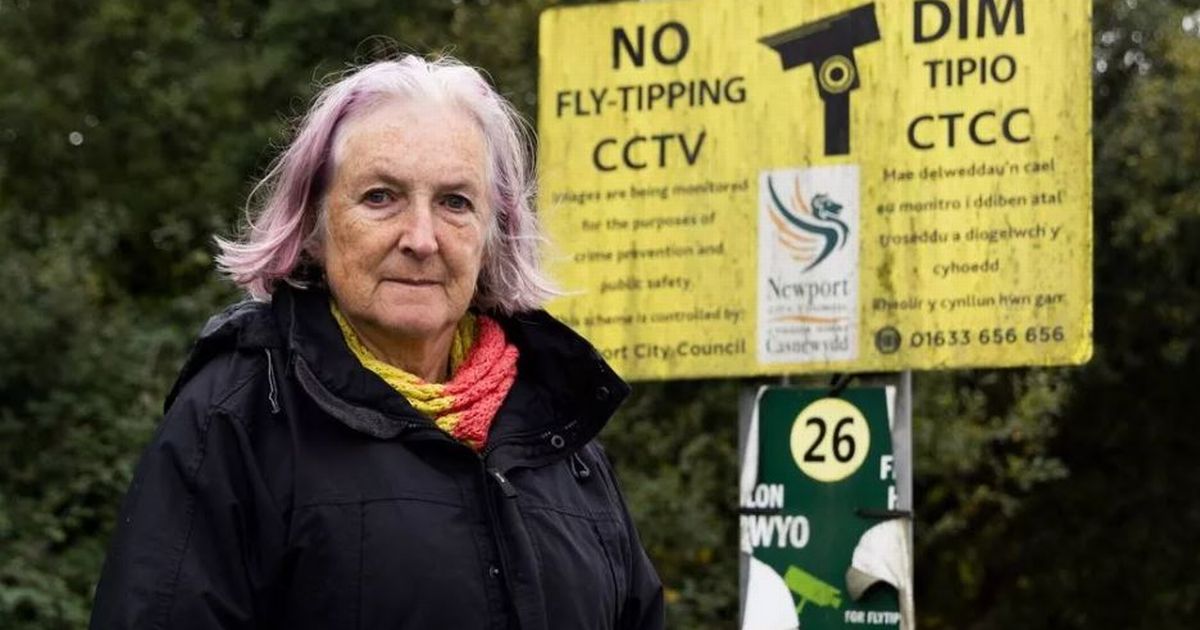A retiree says she hasn’t had a single viewing on her house in four years, as the area struggles with a staggering surge in fly-tipping that’s making homes impossible to sell.
Phoebe Jobling and Filipa Gaspar
14:53, 16 Oct 2025
 Ellen claims she is unable to sell her house due to fly-tipping getting ‘worse and worse'(Image: SWNS)
Ellen claims she is unable to sell her house due to fly-tipping getting ‘worse and worse'(Image: SWNS)
A woman who has been trying to sell her property for the last four years says it’s becoming ‘impossible’ and that she hasn’t had ‘a single viewing’. Ellen Law, a 70-year-old retiree, is amongst the residents living in Newport, Wales, which has been dubbed the ‘UK’s fly-tipping capital’.
The city has experienced a staggering 6,000 percent increase in illegal rubbish dumping, to the point where residents claim they can’t sell their homes. Newport is facing calls for action as chemical waste, asbestos and heaps of rubbish are being dumped outside people’s homes.
Locals describe it as experiencing a “pandemic” of fly-tipping with discarded fridges on laybys, ovens abandoned in trees and deceased animals. Residents report lorries arriving under cover of darkness to unload their contents, Manchester Evening News reports.
In the village of Peterstone, within Newport, locals claim that the escalating problem of fly-tipping, which has worsened over the years, is preventing them from selling their properties. Ellen Law, who has been attempting to sell her house for four years but has not had any viewings, claims that fly-tipping has been an issue since the 90s and operates “as a business”.
Maintaining a property she can’t sell is proving difficult, she says. “We are hidden down here. We are the lost part of Wales,” she said “I don’t think there is anywhere like this with this amount of fly-tipping. It has been impossible to sell the house because this area is really known now for fly-tipping.”
“To see it happening in real time is shocking,” she added. “This is the area that has become a huge black spot and to watch it grow bigger is heartbreaking. Fly-tipping was an unusual thing and has now become the norm.
“It is horrible if you think of all the beautiful animals you have here. But it is not all lost if we can intervene. The community has battered – but there is a point if you think about the wildlife surviving this.”
Illegal dumping across Wales has reached a decade-long peak with 42,171 incidents recorded in 2023-2024. StatsWales data shows Newport experienced 8,139 fly-tipping cases in 2023-2024. This marks a staggering 6,021 percent rise in Newport since illegal dumping records commenced in 2006-2007.
Lee Colvin, 44, discovered hazardous chemicals abandoned outside his Peterstone property after spotting “corrosive and irritant” warning labels on a discarded tank.
 Heaps of rubbish are being dumped outside people’s homes(Image: SWNS)
Heaps of rubbish are being dumped outside people’s homes(Image: SWNS)
The ex-science teacher and community councillor revealed other locals have found asbestos dumped near their properties. He has witnessed motorists driving through the village and hurling rubbish bags from car windows.
“It’s a pandemic. You just drive around and you see people dumping their bin bags,” Lee said. “I have neighbours who had to confront people and been chased by fly-tippers for confronting them. I know of people who have had asbestos dropped outside their houses.”
Lee remembers one occasion when the village exit routes were blocked with waste, trapping residents inside their community. “It is quite a rural area so at night it is very dark and most of the fly tipping from my understanding seems to be happen in the early hours in the morning,” he said.
“The fly-tipping that we are seeing some of it is clearly industrial waste, some of it is from local businesses, or people disposing of their local waste like toys and fridges.”
Those caught fly-tipping could be hit with fines of up to £50,000 (€57,628) and face up to six months behind bars. This penalty can be extended to five years if dangerous waste is illegally dumped.
When prosecuted in crown court, there are no limits on fines and offenders can be jailed for up to five years. Warning signs and cameras are regularly installed, though some have been vandalised.
“There’s no cameras controlling it. Getting rid of waste is very expensive these days,” said Lee. “It’s more cheap and cost effective to fly-tip than taking stuff to the tip because now you get charge for a bag of rubble. The cameras are really important so they can see who’s coming to these roads. The laws to fly-tipping are very complicating because you have to see it happening to report it.”
Close to Peterstone at the Gwent Levels – an internationally important Site of Special Scientific Interest – illegally dumped rubbish is easily spotted. Sacks of used nappies, construction debris and plastic are heaped beside narrow country lanes.
Residents said they had been stranded by discarded building rubble that had blocked roads. David Winstanley, a 77 year old retiree from Peterstone, has expressed his frustration over the persistent issue of fly-tipping in his area.
“It’s got worse since they started charging to take stuff to the dump for business,” said David. “The people that dump it know that it is going to be cleared away so it doesn’t solve the problem. This is a beautiful area that has been spoilt by these people who just don’t care.”
David also mentioned a bungalow in the village that has been on sale for a long time but has garnered no interest due to the ongoing issue. His wife, Ruth Winstanley, a 70 year old housing officer, shared her own experiences with the litter problem.
“The most shocking is when the tipper trucks come and drive along Green Lane just tip it and keep driving so the whole road is just full of bricks,” she said. “We do litter pickings every now and then, but it is fighting a losing battle.”
Newport Council acknowledged the issue, describing it as a “complex issue” and linking the fly-tipping to organised crime. The council has expressed its support for “greater powers” to combat the issue, including an increase in the maximum fine they can impose on individuals. “It requires coordinated action across enforcement, intelligence sharing, and public education,” added the council.
The Welsh government revealed that it has invested £1.2m (€1.4m) over the past three years into Fly-tipping Action Wales, a unique initiative with no equivalent elsewhere in the UK. The cost of cleaning up all fly-tipping incidents in Wales amounted to £1,936,566 (€2,232,027).
Newport was recently labelled as “Wales’ fly-tipping capital”, prompting Member of the Senedd Natasha Asghar to urge the first minister to take more action to address the problem in the city. Local campaigner and former Conservative Senedd election candidate Michael Enea, who runs a community litter group in St. Julians, Newport, where he resides, commented: “We’re seeing fridge freezers, ovens and furniture dumped on the roadside.
“But more than anything else, the sheer number of household black bags dumped has astronomically increased. Over the last 5 years there’s been a noticeable increase in fly-tipping right across Newport. In the city we’ve seen household bin sizes reduced from 180L bins down to 120L. On top of this, two years ago the council also introduced three weekly bin collections.”
Newport City Council stated that it takes fly-tipping “very seriously” and has ramped up efforts to “crack down” on the issue. A spokesperson stated: “Every incident is properly recorded and investigated, and enforcement action is taken where evidence is found.”
The council has increased its budget for tackling fly-tipping, with enforcement actions rising from 165 to 2,390. They added: “As part of our crackdown, we have been deploying CCTV cameras in known fly-tipping hotspots. This helps us collect clear evidence which is vital for identifying those responsible for breaking the law.”
The Welsh Government commented: “Fly-tipping is a crime and is never justified under any circumstances. We continue to target those who chose to break the law and pollute our environment. This is why we continue to fund the Fly-tipping Action Wales, a programme hosted by Natural Resources Wales and which supports local authorities with their enforcement activities, monitor fly-tipping levels and help raise awareness.”
Subscribe to our newsletter for the latest news from the Irish Mirror direct to your inbox: Sign up here.
